Audi Q5 VS Nissan Leaf
Audi Q5
The Audi Q5 exudes a perfect blend of luxury and performance, making it a standout in the competitive SUV market. Its elegant design is complemented by a spacious and meticulously crafted interior, providing both comfort and functionality for drivers and passengers alike. With advanced technology and a range of powerful engines, the Q5 effortlessly combines driving pleasure with practicality for everyday use.
more informationNissan Leaf
The Nissan Leaf stands out as a pioneering model in the realm of electric vehicles, known for its impressive blend of practicality and eco-friendliness. It offers a smooth and quiet driving experience, making it an ideal choice for city commuting and longer journeys alike. The interior design is both comfortable and intuitive, providing drivers with a sense of modernity and ease of use.
more information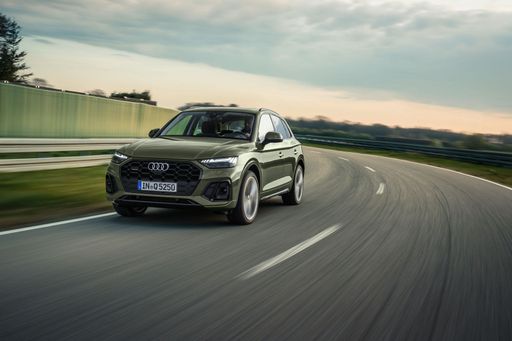 @ audi-mediacenter.com
@ audi-mediacenter.com
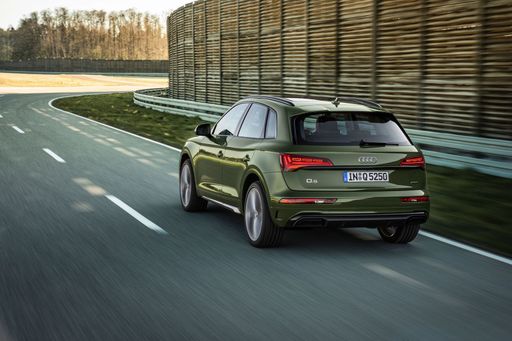 @ audi-mediacenter.com
@ audi-mediacenter.com
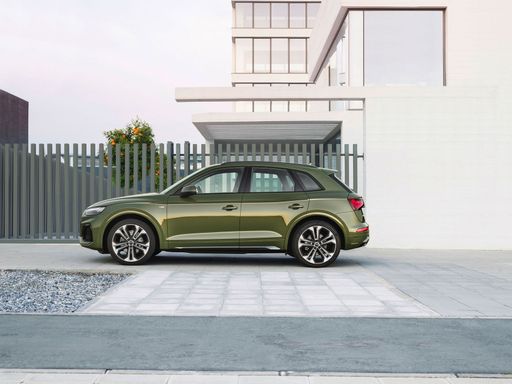 @ audi-mediacenter.com
@ audi-mediacenter.com
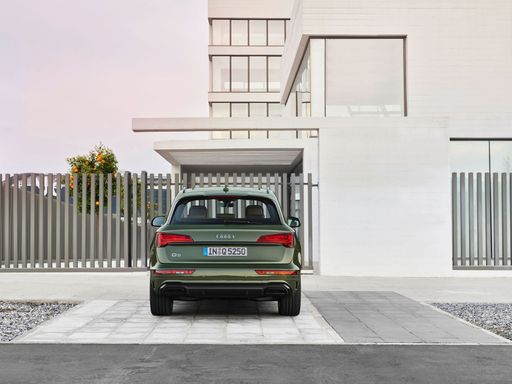 @ audi-mediacenter.com
@ audi-mediacenter.com
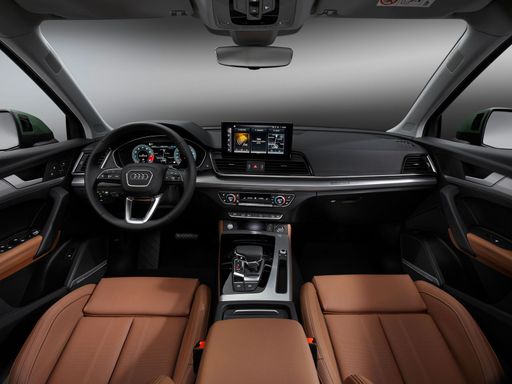 @ audi-mediacenter.com
@ audi-mediacenter.com
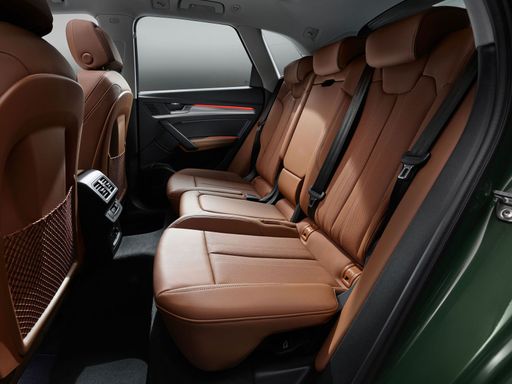 @ audi-mediacenter.com
@ audi-mediacenter.com
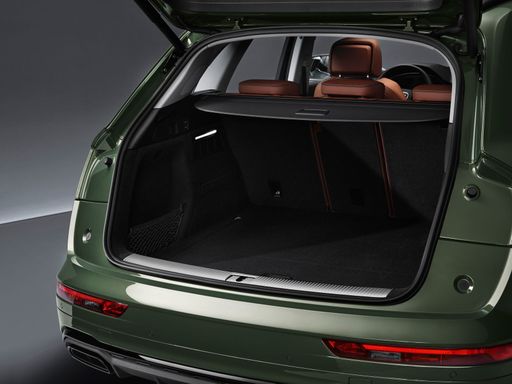 @ audi-mediacenter.com
@ audi-mediacenter.com
 @ germany.nissannews.com
@ germany.nissannews.com
 @ germany.nissannews.com
@ germany.nissannews.com
 @ germany.nissannews.com
@ germany.nissannews.com
 @ germany.nissannews.com
@ germany.nissannews.com
Costs and Consumption |
|
|---|---|
|
Price
about 42800 - 76800
£
|
Price
about 30800 - 37200
£
|
|
Consumption L/100km
1.5 - 8.4
L
|
Consumption L/100km
-
|
|
Consumption kWh/100km
-
|
Consumption kWh/100km
16.7 - 17.8
kWh
|
|
Electric Range
61 - 62
km
|
Electric Range
270 - 385
km
|
|
Battery Capacity
14.4
kWh
|
Battery Capacity
39 - 59
kWh
|
|
co2
35 - 213
g/km
|
co2
0
g/km
|
|
Fuel tank capacity
54 - 70
L
|
Fuel tank capacity
-
|
Dimensions and Body |
|
|
Body Type
SUV
|
Body Type
Hatchback
|
|
Seats
5
|
Seats
5
|
|
Doors
5
|
Doors
5
|
|
Curb weight
1810 - 2150
kg
|
Curb weight
1580 - 1756
kg
|
|
Trunk capacity
455 - 520
L
|
Trunk capacity
385 - 394
L
|
|
Length
4682 - 4717
mm
|
Length
4490
mm
|
|
Width
1893 - 1900
mm
|
Width
1788
mm
|
|
Height
1633 - 1662
mm
|
Height
1540 - 1545
mm
|
|
Payload
495 - 630
kg
|
Payload
384 - 415
kg
|
Engine and Performance |
|
|
Engine Type
Diesel MHEV, Petrol MHEV, Plugin Hybrid
|
Engine Type
Electric
|
|
Transmission
Automatic
|
Transmission
Automatic
|
|
Transmission Detail
Automat. Schaltgetriebe (Doppelkupplung), Automatic Gearbox
|
Transmission Detail
Reduction Gearbox
|
|
Drive Type
All-Wheel Drive, Front-Wheel Drive
|
Drive Type
Front-Wheel Drive
|
|
Power HP
163 - 367
HP
|
Power HP
150 - 217
HP
|
|
Acceleration 0-100km/h
4.5 - 9
s
|
Acceleration 0-100km/h
6.9 - 7.9
s
|
|
Max Speed
213 - 250
km/h
|
Max Speed
144 - 157
km/h
|
|
Torque
320 - 700
Nm
|
Torque
320 - 340
Nm
|
|
Number of Cylinders
4 - 6
|
Number of Cylinders
-
|
|
Power kW
120 - 270
kW
|
Power kW
110 - 160
kW
|
|
Engine capacity
1968 - 2995
cm3
|
Engine capacity
-
|
|
Top speed
213 - 250
km/h
|
Top speed
144 - 157
km/h
|
General |
|
|
Model Year
2023 - 2025
|
Model Year
2019
|
|
CO2 Efficiency Class
E, F, G, B
|
CO2 Efficiency Class
A
|
|
Brand
Audi
|
Brand
Nissan
|
Audi Q5
The Audi Q5 stands as a prominent figure in the luxury SUV segment, combining elegant design with cutting-edge technology and efficient performance. As of its latest models, the Q5 continues to impress with a multitude of engine options, including mild-hybrid and plug-in hybrid variants, catering to a range of driving preferences and environmental considerations.
Dynamic Performance and Engine Innovation
At the heart of the Q5’s appeal lies its impressive powertrain offerings. The range includes both diesel and petrol engines, featuring advanced mild-hybrid technology, which enhances efficiency and performance. The integration of the mild-hybrid system allows for reduced fuel consumption and lower CO2 emissions without compromising on power. With outputs ranging from 163 to 367 PS, the Q5 offers an exhilarating driving experience, whether purists opt for the robust diesel engines or the spirited petrol variants.
Impressive Fuel Economy
One of the standout features of the Audi Q5 is its remarkable fuel efficiency. With fuel consumption figures as low as 1.5 L/100km for the plug-in hybrid models, the Q5 sets a benchmark in its class. Coupled with a spacious fuel tank that can hold between 54 and 70 litres, drivers can enjoy extended journeys without frequent refueling stops. Even the conventional engines maintain competitive efficiency, making the Q5 an excellent option for eco-conscious consumers.
Advanced Safety and Driver Assistance Technologies
The Q5 is equipped with an array of advanced safety features and driver assistance systems that enhance the driving experience. Technologies such as adaptive cruise control, lane departure warning, and collision avoidance systems provide an additional layer of security for both driver and passengers. Furthermore, the Q5's infotainment system is intuitive and user-friendly, featuring connectivity options that keep you seamlessly connected on the road.
Luxurious Interior and Comfort Features
Step inside the Audi Q5, and you will immediately be captivated by its sophisticated cabin that boasts high-quality materials and attention to detail. The spacious interior comfortably seats five passengers, providing ample head and legroom. The rear seats can be adjusted to enhance cargo space, with boot capacity ranging from 455 to 520 litres, perfect for family outings or road trips. High-end audiovisual systems and customizable ambient lighting contribute to an atmosphere of luxury that Audi is renowned for.
All-Wheel Drive Versatility
Equipped with Audi's legendary quattro all-wheel drive system, the Q5 delivers exceptional grip and handling across various terrains and weather conditions. This capability ensures that drivers can have confidence whether navigating urban environments or venturing off the beaten path. The front-wheel drive variants also offer a commendable driving performance while maintaining efficiency.
Conclusion: The Ultimate Luxury SUV
The Audi Q5 is a masterful combination of luxury, performance, and practicality. With its range of powerful and efficient engines, advanced technology, and a focus on driver and passenger comfort, the Q5 sets itself apart in the crowded SUV market. Whether for commuting, family trips, or weekend getaways, the Q5 is designed to meet diverse needs and preferences with style and sophistication.
Nissan Leaf
Introduction to the Nissan Leaf: A Pioneer in Electric Mobility
The Nissan Leaf has established itself as a trailblazer in the realm of electric vehicles (EVs) since its launch. As we delve into its present-day iterations, the Leaf continues to soar in popularity due to remarkable advancements in technology and sustainability. Let's explore what makes the Nissan Leaf a standout in today's automotive market.
Power and Performance: Under the Hood of the Nissan Leaf
The Nissan Leaf boasts a power output ranging from 150 to 217 PS, depending on the battery option chosen. The vehicle's electric motor, a product of cutting-edge engineering, offers instant torque ranging from 320 to 340 Nm, resulting in impressive acceleration capabilities. The 0 to 100 km/h dash is achieved in as little as 6.9 seconds, showcasing its prowess in electric performance.
Battery Technology: Efficient Energy Management
When discussing the Nissan Leaf, battery technology is at the forefront. The available battery capacities range from 39 to 59 kWh, supporting an electric range between 270 to 385 km. This flexibility allows drivers to choose a model that best fits their driving habits, providing peace of mind for longer journeys without frequent recharging.
Sustainability: The Environmental Edge
One of the primary attractions of the Nissan Leaf is its commitment to sustainability. As an all-electric vehicle, it produces zero CO2 emissions, placing it in the top tier of the CO2-efficiency class with an 'A' rating. This clean energy approach contributes significantly to reducing environmental impact and supports Nissan's drive towards a greener future.
Design and Comfort: Aesthetic Appeal and Practicality
The Nissan Leaf is not just about efficiency; it's also designed for comfort and utility. With its sleek hatchback body and dimensions of 4490 mm in length, 1788 mm in width, and a height of up to 1545 mm, it offers ample interior space. The boot capacity ranges from 385 to 394 litres, providing sufficient storage for everyday needs. The model accommodates five passengers comfortably, ensuring a pleasant ride for everyone.
Innovations and Safety: Advanced Features for Peace of Mind
Nissan equips the Leaf with an array of intelligent features that enhance safety and convenience. The available equipment lines, including N-CONNECTA, Tekna, e+ N-CONNECTA, and e+ Tekna, offer varying levels of technology integration. ProPILOT Assist, e-Pedal, and a comprehensive suite of driver-assistance technology are just a few examples that highlight Nissan's commitment to innovation in the EV market.
Conclusion: The Nissan Leaf Continues to Lead
With prices ranging from €35,900 to €43,400, the Nissan Leaf remains an attractive choice for those looking to embrace electric mobility. It perfectly balances performance, design, and sustainability, making it a compelling choice in the competitive EV landscape. The Nissan Leaf not only represents the future of driving but also reinforces why it continues to be a leader in the electric vehicle community.
